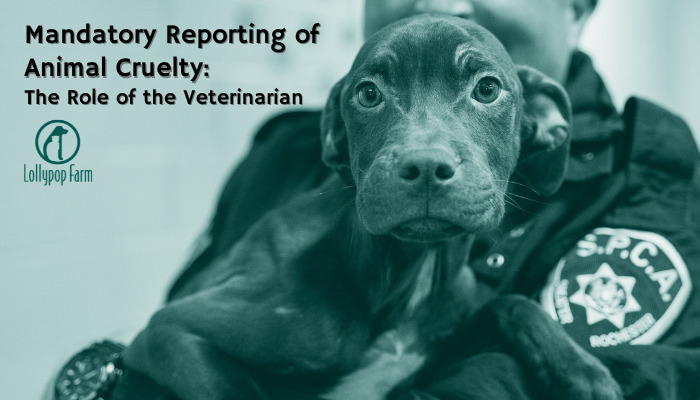In the realm of veterinary medicine, practitioners often find themselves at the intersection of animal care, ethical responsibilities, and legal obligations. The question of whether veterinarians are mandatory reporters for animal cruelty is not merely a legalistic nuance; it embodies a profound ethical conundrum that challenges the very essence of the veterinary profession. With the welfare of animals at stake, understanding this dynamic is crucial for both veterinarians and the communities they serve.
To navigate this intricate issue, it is essential to first grasp the concept of mandatory reporting. This legal requirement obligates certain professionals to report any suspicions of abuse or neglect to the appropriate authorities. In many jurisdictions, teachers, social workers, and healthcare providers fall under this category. The question arises: do veterinarians, those who possess an intimate knowledge of animal health and behavior, hold a similar position?
In numerous states, the law does classify veterinarians as mandatory reporters of animal cruelty. This designation often stems from their unique vantage point of observing physical signs of maltreatment that might go unnoticed by others. Unlike the general public, veterinarians are trained to recognize injuries, neglect, and malnutrition in animals, making their insights invaluable. Consequently, when a veterinarian encounters an animal suffering from apparent abuse, they are bound by legal and ethical tenets to take action—this may include reporting the incident to animal control or law enforcement.
However, the role of a veterinarian as a mandatory reporter is imbued with complexities. Ethical considerations often loom large, creating a palpable tension between a veterinarian’s duty to care for their patients and the professional obligations imposed by the law. Animal welfare advocates insist that reporting abuses is essential for the protection of vulnerable creatures, highlighting that silence can perpetuate cycles of cruelty. Yet, there exists a counter-narrative that emphasizes compassion for the human perpetrators, who may be struggling with their circumstances. This perspective posits that understanding the underlying causes of abusive behavior could lead to rehabilitation rather than prosecution, thereby fostering a more compassionate society.
Moreover, the variations in laws across different regions can further complicate veterinary obligations. In some jurisdictions, the legal framework surrounding mandatory reporting may be vague or poorly defined, leaving veterinarians uncertain about when and how to act on their observations. In such cases, the interplay of ethics and legality may result in hesitation or inaction, ultimately putting animals at further risk. This uncertainty underscores the importance of ongoing education and training for veterinarians regarding their responsibilities as mandatory reporters, empowering them to act decisively when confronted with signs of cruelty.
The role of veterinarians transcends the mere act of reporting and extends into the realm of advocacy. By championing animal welfare, veterinarians can become pivotal figures in their communities, working to educate the public about responsible pet ownership and the signs of animal abuse. This proactive approach seeks not only to mitigate existing cruelty but also to cultivate a culture of compassion and vigilance towards all living beings. In light of this mission, veterinarians can advocate for changes in legislation that enhance protections for animals, striving for a future where mandatory reporting is universal and unequivocal.
The question of whether veterinarians should be mandatory reporters cannot be addressed without considering the implications of their findings on human behavior as well. Vets often encounter cases where neglect or abuse may be symptomatic of broader societal issues such as poverty or mental health struggles. This recognition sparks a dialogue regarding the responsibility of veterinarians to engage with social services and community organizations, fostering a holistic approach to both animal and human welfare. As veterinary professionals cultivate relationships with these entities, they broaden the scope of their impact, potentially transforming lives beyond the clinic’s walls.
Furthermore, the emotional toll of witnessing animal suffering can weigh heavily on veterinarians, prompting discussions about mental health support within the profession. Having the capacity to report animal cruelty while navigating the emotional complexities of such situations requires an intricate balance of resilience and empathy. For those veterinarians who encounter distressing cases frequently, having access to mental health resources—whether through professional counseling or peer support groups—may serve to bolster their well-being and fortify their capacity to advocate effectively for animals.
In conclusion, the intersection of ethics and obligation within the veterinary profession presents a profound challenge as veterinarians grapple with their dual roles as caregivers and mandatory reporters. The legalities surrounding animal cruelty reporting are not merely bureaucratic mandates; they invoke a deep ethical commitment to the creatures who cannot speak for themselves. By recognizing their pivotal role in safeguarding animal welfare, veterinarians can take empowered steps to act in the best interest of both animals and the humans who may be inadvertently contributing to their suffering.
The quest to ensure the protection of animals is an ongoing journey, fraught with moral dilemmas and complex decisions. Ultimately, the question of whether veterinarians should be mandated to report animal cruelty may not only reshape the legal landscape but also serve as a catalyst for a paradigm shift in how society perceives and addresses animal welfare. In this evolving narrative, the veterinarian’s voice can resonate strongly, advocating for justice, compassion, and a future where all beings are afforded the respect and care they deserve.








